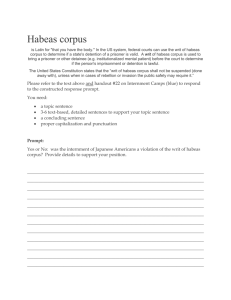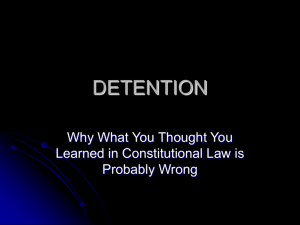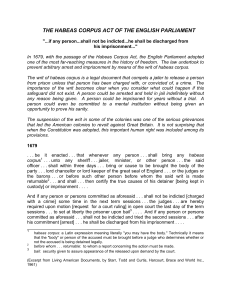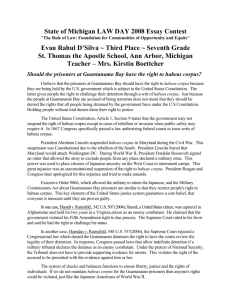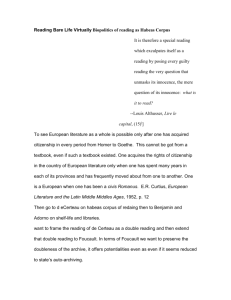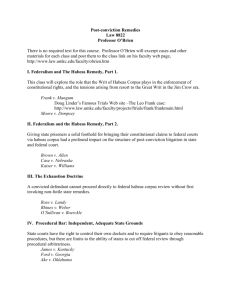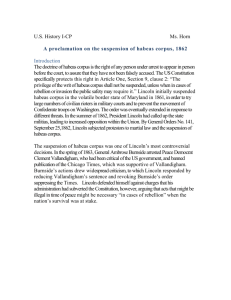Liberty and Security - Northern Illinois University
advertisement
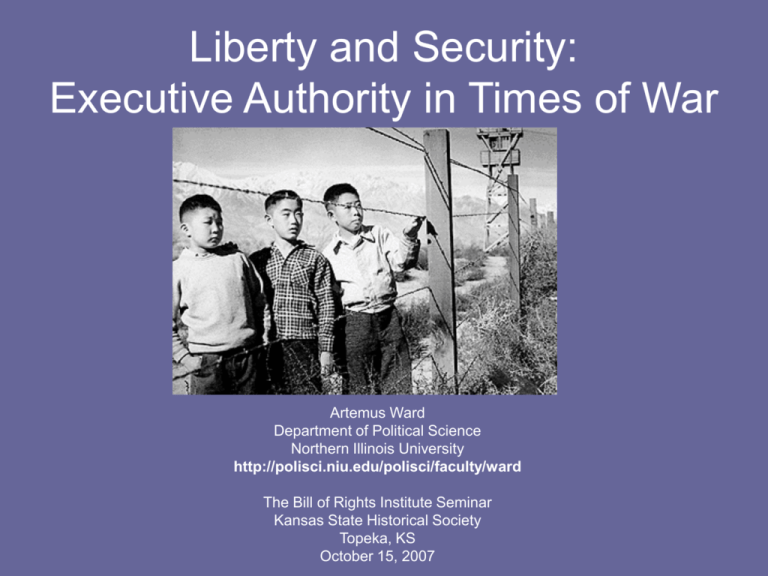
Liberty and Security: Executive Authority in Times of War Artemus Ward Department of Political Science Northern Illinois University http://polisci.niu.edu/polisci/faculty/ward The Bill of Rights Institute Seminar Kansas State Historical Society Topeka, KS October 15, 2007 Habeas Corpus • Art. I, Sec. 9 of the Constitution says, “The Privilege of the Writ of Habeas Corpus shall not be suspended, unless when in Cases of Rebellion or Invasion the public Safety may require it.” • Who is protected by habeas corpus? U.S. citizens? Persons in the U.S.? Person’s held by the U.S. government? • Art. I outlines legislative, not executive power. Therefore, is this a limitation on legislative power? • Can the executive unilaterally suspend habeas corpus? The U.S. Supreme Court on War and Security • Civil War: Ex Parte Milligan (1866) • WWII: Korematsu v. United States (1945) • War on Terrorism: – Rasul v. Bush (2004) – Hamdi v. Rumsfeld (2004) The Civil War • President Abraham Lincoln took a number of steps to suppress “treacherous” behavior, believing “that the nation must be able to protect itself in war against utterances which actually cause insubordination.” • Several times during the war, Lincoln issued orders expanding military control over civilian areas in the North, permitting military arrests and trials of civilians, and suspending habeas corpus. Can the president unilaterally suspend habeas corpus? Can U.S. citizen’s be denied due process rights? • • Ex parte Milligan (1866) • • • • Milligan was an attorney living in Indiana. He was a confederate sympathizer (a Copperhead) and made speeches and organized against the war. He was arrested by the military, found guilty by a military tribunal, and was sentenced to be hanged. He filed a writ of habeas corpus in federal court claiming that he should not have been tried by the military and that the President did not have the authority to suspend habeas corpus. The Court said, “It is difficult to see how the safety of the country required martial law in Indiana. If any of her citizens were plotting treason, the power of arrest could secure them, until the government was prepared for their trial, when the courts were open and ready to try them. It was as easy to protect witnesses before a civil as a military tribunal; and as there could be no wish to convict, except on sufficient legal evidence, surely an ordained and established court was better able to judge of this than a military tribunal composed of gentlemen not trained to the profession of the law.” 5 justices said that neither the president nor congress acting separately or together could suspend habeas corpus where civilian courts functioned. 4 justices said that the even though they didn’t use it, Congress has the power to suspend habeas corpus and use military tribunals. The justices chose not reach the question of whether the president can unilaterally suspend habeas corpus when civilian courts are NOT functioning. Korematsu v. United States (1945) • • • • • • During World War II, Presidential Executive Order 9066 and congressional statutes gave the military authority to exclude citizens of Japanese ancestry from areas deemed critical to national defense and potentially vulnerable to espionage. Fred Korematsu was born in San Francisco, tried to join the military but was denied for health reasons, and instead worked as a welder in the defense industry. He was engaged to an Italian-American woman and decided to undergo plastic surgery to convince authorities that he was of SpanishHawaiian origin. Korematsu remained in San Leandro, California and violated Civilian Exclusion Order No. 34 of the U.S. Army. The Court sided with the government and held that the need to protect against espionage outweighed Korematsu's rights. Justice Black argued that compulsory exclusion, though constitutionally suspect, is justified during circumstances of "emergency and peril." Korematsu v. United States (1945) • Justice Frank Murphy dissented: • “This exclusion goes over ‘the very brink of constitutional power’ and falls into the ugly abyss of racism.” • “The judicial test of whether the Government, on a plea of military necessity, can validly deprive and individual of any of his constitutional rights is whether the deprivation is reasonably related to a public danger that is so ‘immediate, imminent, and impending’ as not to admit delay and not to permit the intervention of ordinary constitutional processes to alleviate the danger.” • “I dissent from the legalization of racism. Racial discrimination in any form and in any degree has no justifiable part whatever in our democratic way of life. All residents of this nation are kin in some way by blood or culture to a foreign land. Yet they are primarily and necessarily a part of the new and distinct civilization of the United States. They must accordingly be treated at all times as the heirs of the American experiment and as entitled to all the rights and freedoms guaranteed by the Constitution.” Korematsu v. United States (1945) • Justice Robert Jackson dissented: • “While an unconstitutional order will only last as long as the conflict, a judicial construction of the due process clause that will sustain this order is a far more subtle blow to liberty than the order itself.” • “The Court for all time has validated the principle of a racial discrimination in criminal procedure and of transplanting American citizens. The principle then lies about like a loaded weapon ready for the hand of any authority that can bring forward a plausible claim of an urgent need.” Korematsu Aftermath • Handed down the same day at Korematsu, the Court held in Ex parte Endo (1945) that citizens deemed “loyal” must be set free. • The 1948 Japanese-Americans Claims Act allowed camp detainees to receive compensation for their losses. The government received $131 million in claims, and paid $38 million to settle them. • In 1988, President Reagan signed the Civil Liberties Act, which gave $20,000 in reparations to camp detainees, as well as an apology for their losses of liberty and property. • In 1998, President Clinton awarded Fred Korematsu the Presidential Medal of Freedom Rasul v. Bush (2004) • • • • • Can non-citizen detainees challenge their detentions in U.S. courts? The Supreme Court found that the degree of control exercised by the United States over the Guantanamo Bay base was sufficient to trigger the application of habeas corpus rights. Justice John Paul Stevens, using a list of precedents stretching back to mid-17th Century English Common Law cases, found that the right to habeas corpus can be exercised in "all ... dominions under the sovereign's control." He said that because the United States exercised "complete jurisdiction and control" over the base, the fact that ultimate sovereignty remained with Cuba was irrelevant. Further, Stevens wrote that the right to habeas corpus is not dependent on citizenship status and applies to all persons under the control of the United States. The detainees were therefore free to bring suit challenging their detention as unconstitutional. Hamdi v. Rumsfeld (2004) • • • In the fall of 2001, Yaser Hamdi, an American citizen, was arrested by the United States military in Afghanistan. He was accused of fighting for the Taliban against the U.S., declared an "enemy combatant," and transferred to a military prison in Virginia. Frank Dunham, Jr., a defense attorney in Virginia, filed a petition for a writ of certiorari in federal district court there, first on his own and then for Hamdi's father, in an attempt to have Hamdi's detention declared unconstitutional. He argued that the government had violated Hamdi's Fifth Amendment right to Due Process by holding him indefinitely and not giving him access to an attorney or a trial. The government countered that the Executive Branch had the right, during wartime, to declare people who fight against the United States "enemy combatants" and thus restrict their access to the court system. Can U.S. citizens be deemed enemy combatants? Yes. Can U.S. citizen-enemy combatants be denied due process? No. Hamdi v. Rumsfeld (2004) • • • • • • • Justice Sandra Day O'Connor wrote for five justices that Congress authorized the president to declare and detain enemy combatants when they passed the Authorization for the Use of Military Force one week after the terrorist attacks of Sep. 11, 2001. However, she also held for eight justices that Fifth Amendment due process guarantees give a citizen held in the United States as an enemy combatant the right to contest that detention before a neutral decisionmaker (though that can be a military tribunal or something less, the presumption is with the government, and hearsay is allowable). Justices Souter and Ginsburg said that Congress had not given the president such authority by the broadly worded AUMF. Justices Scalia and Stevens said that absent a formal suspension of the writ of habeas corpus, citizens must be tried for treason. Justice Thomas said that the AUMF is explicit approval for the president to do whatever he wants with citizen enemy combatants. The justices again declined to answer the question of whether the president can unilaterally suspend habeas corpus and declare citizens enemy combatants. In Sep. 2004, the Bush Administration cut a deal with Hamdi. He would not be criminally prosecuted and was sent home to his family in Saudi Arabia on a Defense Dept. jet. However, he had to renounce his U.S. citizenship, pledge never to sue the U.S., and agree never to set foot in Afghanistan, Iraq, Israel, Pakistan, Syria, the West Bank and Gaza Strip, and the United States. Conclusion • In all we see a pattern of executive action in favor of security, congressional acquiescence, and the Court struggling to strike a balance between liberty and security. • The three branches continue to battle over this issue. This Term, the Court will decide the case of Boumedene v. Bush and decide whether the Military Commissions Act (2006), which among other things strips federal courts including the U.S. Supreme Court of habeas jurisdiction over detainees, is constitutional. • Does the MCA satisfy the constitutional requirements of the Suspension Clause?
